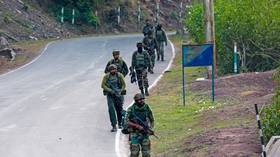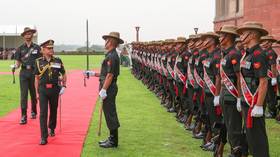India steps up operations in Jammu and Kashmir after deadly attack

The Indian Army has intensified search operations to eliminate terrorists who have crossed the Pakistani border in the thick forest of Jammu and Kashmir’s Doda district, Indian media reported on Wednesday, citing officials.
The development comes after four Indian soldiers, including an officer, were killed overnight Monday into Tuesday in an encounter with terrorists in the area. In a statement, the Indian Army identified the deceased as Captain Brijesh Thapa, Naik D Rajesh, Sepoy Bijendra, and Sepoy Ajay Naruka.
Days earlier, five Indian Army personnel were killed and five others injured after terrorists attacked a military convoy in the Kathua district of Jammu and Kashmir. In the past 32 months, 48 Indian Army personnel have been killed in the region, which has seen a spate of infiltration attempts and terrorist attacks in the past few months, according to NDTV.
On Sunday, the Indian military announced that three terrorists were killed in an anti-infiltration operation along the Line of Control between India and Pakistan, in the Kupwara district of Jammu and Kashmir.
Jammu and Kashmir Director General of Police RR Swain claimed on Monday that Pakistan has infiltrated “all important aspects of civil society” in the region, and accused regional political parties in the valley of assisting terrorists.
The region has been at the center of a territorial dispute between India and Pakistan for decades, and they have fought several wars over it. In 1947, Pakistan took over a portion of Kashmir which it now administers. Despite a ceasefire agreed to in February 2021, sporadic clashes continue.
New Delhi has repeatedly called on Islamabad to end its alleged “cross-border terrorism.” Last month, Indian Home Minister Amit Shah, who chaired a high-level meeting with security agencies, claimed that India’s fight against terrorism in Jammu and Kashmir is in its “decisive phase” and the government “will leave no stone unturned in rooting out terrorism” from the region.
After the latest attack, Mehbooba Mufti, the leader of the regional People’s Democratic Party (PDP) and a former chief minister, demanded Swain’s firing. “[Swain’s] job is to break the PDP, harass people and journalists, and threaten people,” she said, adding that “heads should have rolled by now.”
Rahul Gandhi, an opposition leader from India’s Congress Party, has lamented the “poor condition” of Jammu and Kashmir and claimed the soldiers and their families are “bearing the brunt” of the ruling Bharatiya Janata Party’s policies.
In 2019, the PM Narendra Modi-led government abolished Article 370 of the constitution, which gave special rights to Jammu and Kashmir, and the state was reorganized into two union territories. The move further worsened ties with Pakistan.
While the Indian Supreme Court upheld the revocation of Article 370 last year, it also directed that statehood in Jammu and Kashmir be restored and legislative assembly elections be held by the end of September 2024.
Earlier this year, Islamabad alleged that ‘Indian agents’ killed two Pakistani citizens linked to terrorist groups on its soil. India called the claims “false and malicious” propaganda.
Where India Meets Russia: Follow and share RT India on X and Instagram














